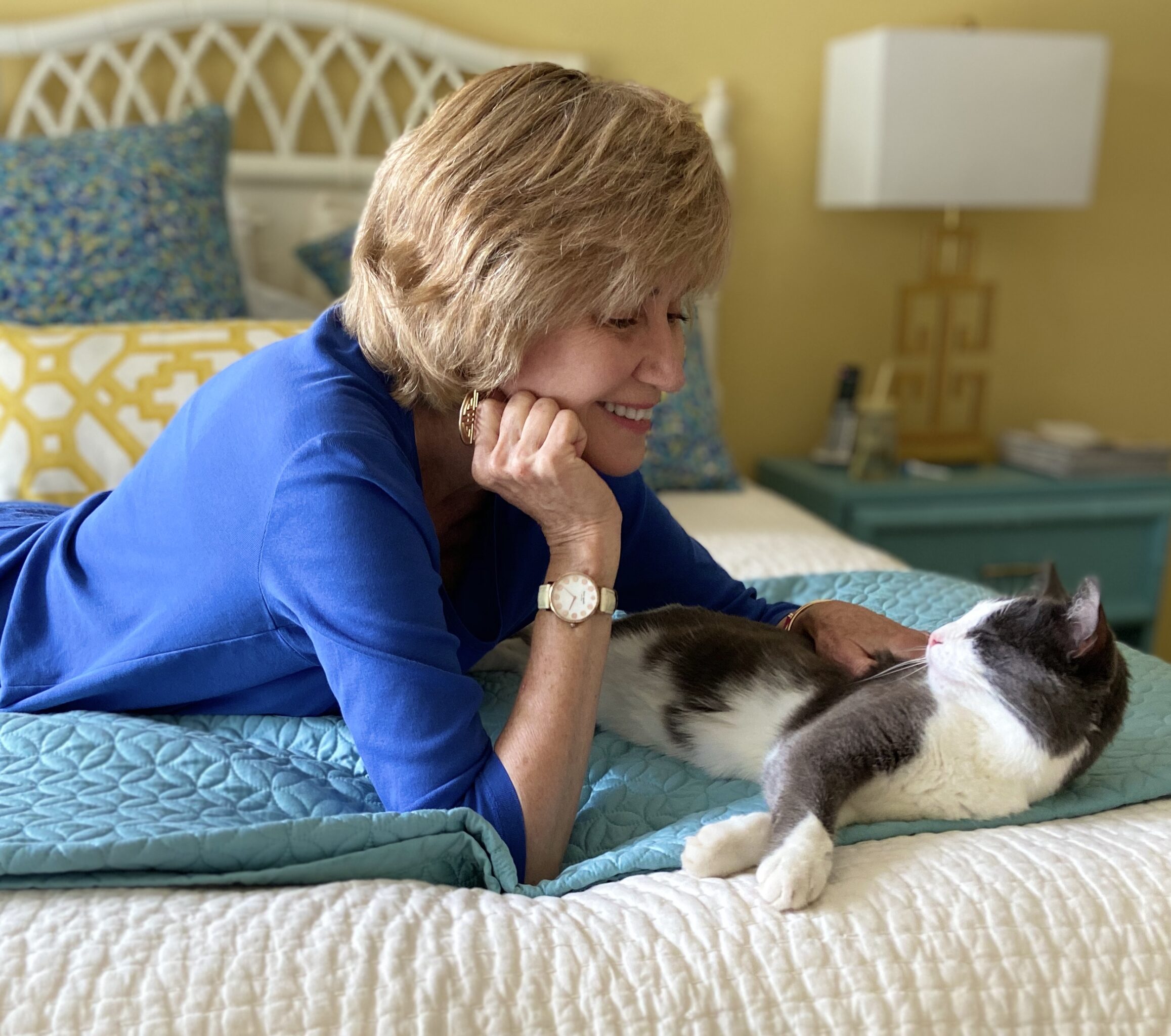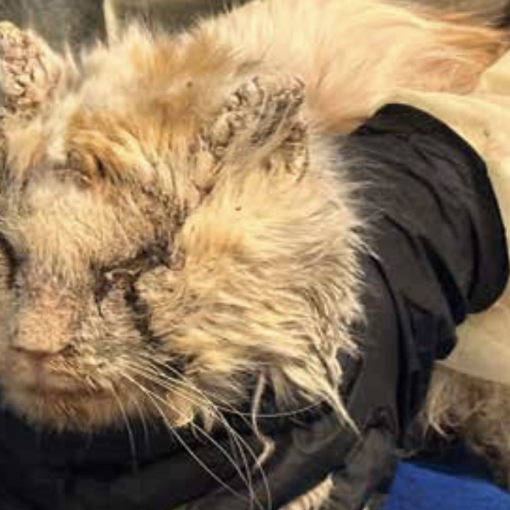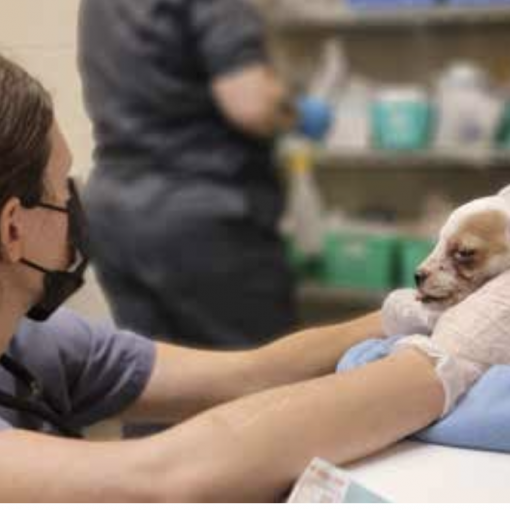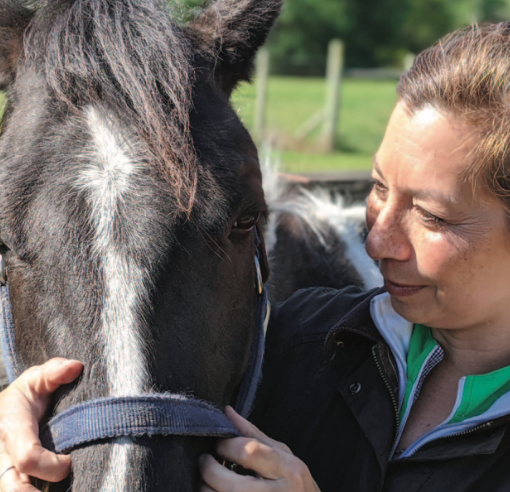How our pets are saving us from a crazy world
By LYNN MCBRIDE
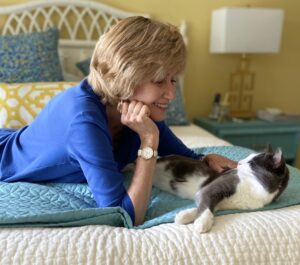 My husband and I live in France half the year, where I often foster and socialize abandoned litters of kittens. While the other kitties have always been content to stay safe in the bedroom I set up as their temporary home, there was a certain kitten that kept sneaking out to explore the rest of the house. Somehow he ended up sleeping in our bed, and...well you know the rest, if you’ve ever known a cat. Vino the Bambino weaseled his way into our hearts, and we were duly adopted.
My husband and I live in France half the year, where I often foster and socialize abandoned litters of kittens. While the other kitties have always been content to stay safe in the bedroom I set up as their temporary home, there was a certain kitten that kept sneaking out to explore the rest of the house. Somehow he ended up sleeping in our bed, and...well you know the rest, if you’ve ever known a cat. Vino the Bambino weaseled his way into our hearts, and we were duly adopted.
As a result, I carted a French cat back to Charleston on an Air France flight last October. Little did I know that when I brought my “failed” rescue cat home, he would play a part in rescuing me from the Coronavirus.
Coronavirus Strikes
At the beginning of March, I took a two-day trip to Washington DC and found myself a pioneer COVID-19 victim. Immediately, I isolated in my bedroom and only saw my husband when he delivered meals to my door.
Want to know what it’s like to have “The Virus?” Trust me, if you went through what I did, you wouldn’t just be social distancing, you’d be cowering under your bed. I was as sick, miserable, and frightened as I’d ever been in my life.
It’s a bizarre illness: it comes, it goes, it comes right back again to bite you. There were days of relative calm where boredom was the biggest problem and other days when I was too sick to eat, sleep, or even to read. I could only lie there, anxiously counting the minutes until the misery passed.
But throughout it all, I had an ace up my sleeve -- my beloved cat was constantly tucked under my arm.
What to do with Vino the Bambino?
We didn't want a contaminated cat roaming the neighborhood or cuddling up to my healthy husband, so the Bambino and I went into lockdown together.
Of course, I scoured the Internet for any info on cats and the Coronavirus. Could they catch it? Could they pass it on? These were the early days of COVID-19 and no one knew for sure. I kept Vino under anxious surveillance, but his behavior never changed.
Vino, accustomed to zipping in and out of his cat door at will, was an amazingly calm roommate. When I was up to it, he provided the entertainment, dashing around the room and playing his favorite game of pillow-diving. Otherwise he slept by my side, purred to calm my anxiety when I didn’t know if I was going to live or die, and listened patiently when I moaned and complained. He was the perfect COVID companion.
Lynn says suffering through COVID-19 was one of the scariest things of her life. She says her cat Vino the Bambino was instrumental in her recovery. (Photo Provided)
Twice I was so ill that I packed a bag for the hospital, but I never went. On the 14th day of my illness, I woke up in my usual state: totally fatigued, unable to eat, difficulty breathing, and wallowing in the “malaise” that most COVID victims experience but which defies description. Then, very suddenly that evening, I perked up, popped out of bed, and was fine. That was that. This is the way the insane COVID-19 works.
Vino and I had survived the Coronavirus!
To be safe, I isolated from my husband for two more weeks, and Vino went back out into the world to resume his duties of dashing up trees and visiting the neighbors.
They say that cats have a sixth sense about illness and death. Perhaps that’s why my normally exuberant cat, who loves to leap and careen about, who wouldn’t dream of wasting a pretty spring day inside, was perfectly calm and content to stay cooped up in my bedroom for two weeks. He snoozed, he cuddled, he never fussed or complained. So, in the end, who rescued whom? I think both Vino and I know the answer.
You can read more of Lynn McBride’s writing at southernfriedfrench.com.
Julia and Lisa
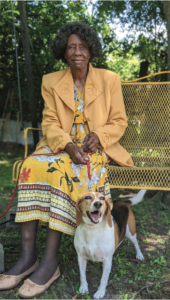
Carolina Tails: Mrs. Collins, you have a beagle named Lisa. How has Lisa helped you during COVID-19?
Julia Collins: She helped me a whole lot because she doesn't demand too much. She likes to eat and I feed her, but, I mean, in the mornings I usually open the door and she will go out in the yard and run around. I have a big yard and she'll run around like she's crazy, and then I call her, and she would not come. So I take the leash and I walk out there and I said, "Okay, Lisa, I'm not playing." And she will come and I put the leash on her and put her back at the house.
Carolina Tails: So, she's making you get a little exercise too?
Julia Collins: Yeah, every day. Every day.
Carolina Tails: A lot of people get lonely because we don't get to go to church as much as we always have or go to the stores and do things that we typically always do. So has that been part of how Lisa has helped you at all?
Julia Collins: Oh yeah. Well, Lisa's here. I mean, you know, she is right here, and when I get up in the morning, I have to take care of her, and that’s a good thing.
Carolina Tails: Can you share your age?
Julia Collins: Yes, I'm 90 years old.
Carolina Tails:: Wow, that's fantastic. What has COVID been like for you, personally?
Julia Collins: Well, when I go out I do. I don't have anybody. I have my granddaughter and her son. He is two years old. So every night they call me on FaceTime, and he wants to know if I'm home, he said, "Is GiGi home?" And so I'll say, "Yes," and then she'll put us on FaceTime and he talks to me. He talks a lot. He's two years old, but he has a mouth like I don't know what.
Carolina Tails: That’s awesome. So as for Lisa, she’s made the COVID-19 quarantine a little better for you?
Julia Collins: Well, she has helped. At night, she will go in to her crate and she snores like a man. You could hear her in my bedroom. Because she sleeps in the hall and I'm in the bedroom. She snores very hard. And I... you should hear her!
Carolina Tails: And so she's obviously very relaxed about the whole situation. Not nervous about anything.
Julia Collins: No. She's not nervous about anything. But you know, I treat my animals like I do people.
Javier Continues to Shine
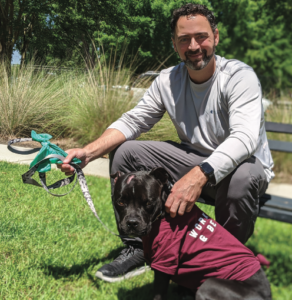 Just before the coronavirus outbreak, a dog named Harvey was brought to Charleston Animal Society with burns over half of his body.
Just before the coronavirus outbreak, a dog named Harvey was brought to Charleston Animal Society with burns over half of his body.
He suffered through incredible pain, but with the expert care of Charleston Animal Society’s medical team – Harvey pulled through.
The entire staff found his story so inspiring that on the day he left the shelter for his new home, everyone lined up outside to give him a final hero’s farewell. Harvey, now Javier, walked past each staff member who stood six feet apart wearing masks. It was an unforgettable experience for all.
Javier’s incredible spirit continues to inspire through the pandemic. “Everybody loves him” says his new Dad Stephan Looney. “He’s famous in the neighborhood. Everyone asks, ‘Is that the burned dog from the news?’ He’s got a big fan club.”
It’s still a mystery how Javier was burned, but the nightmares persist. “He’ll go to sleep and suddenly his legs move like he’s running and then the whimpering begins,” Looney says. “Then he growls and ends up screaming. As fast as we can, we wake him up and he immediately jumps straight up and buries his face in my armpit and starts wagging his tail. It reminds him that he’s safe and that the horror of his previous life is over.”
Through the COVID-19 crisis, Javier has added a new dimension to the Looney family. They spend more time together because of Javier, who has them walking 6- 7 miles a day (9 on weekends)! “Yea, he’s prevented me from getting lazy,” says Looney.
Javier has also learned to play. Looney says when Javier first got a ball, he didn’t know what to do. But watching this amazing dog discover joy again has been a wonderful thing to see during these strange times we are living through.

